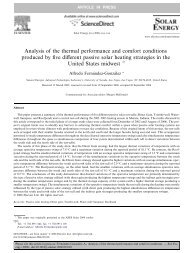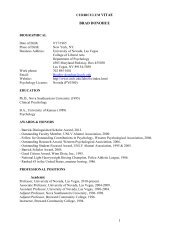2013 Conference Proceedings - University of Nevada, Las Vegas
2013 Conference Proceedings - University of Nevada, Las Vegas
2013 Conference Proceedings - University of Nevada, Las Vegas
- No tags were found...
You also want an ePaper? Increase the reach of your titles
YUMPU automatically turns print PDFs into web optimized ePapers that Google loves.
THE INTERVIEW PROJECTAngel Rowe AbneyGeorgia College & State <strong>University</strong>angel.abney@gcsu.eduDoris SantaroneGeorgia College & State <strong>University</strong>doris.santarone@gcsu.eduIn a mathematics content course for preservice early childhood teachers (PSTs), an interviewproject is used to analyze whether the PSTs can learn to listen to, analyze a child’s mathematics,and inform their mathematics and teaching. Our study suggests that this project is an effectivetool for changing PSTs views <strong>of</strong> the discipline <strong>of</strong> mathematics and what it means to teachmathematics.In the teaching principle, the National Council <strong>of</strong> Teachers <strong>of</strong> Mathematics (2000) called forteachers to have not only a deep understanding <strong>of</strong> the content that they teach, but also knowledge<strong>of</strong> their students. To make this type <strong>of</strong> reform in mathematics education possible, Thompson andThompson (1994) contended that classroom discourse and communication are essentialelements. They suggested that teachers “must be sensitive to children’s thinking duringinstruction and shape their instructional actions accordingly—to ensure that children hear whatthey intend them to hear” (p. 279). If the current practice <strong>of</strong> assessment and instruction is tochange, how might this change occur? Where does such reform begin? We believe it shouldbegin with preservice teacher (PST) education.As instructors <strong>of</strong> the first mathematics content course in a sequence <strong>of</strong> four courses for earlychildhood majors, we want the PSTs to develop an intuitive number sense. We also believe thatthey need to work toward communicating using precise mathematical terminology to constructand justify arguments. A major part <strong>of</strong> the work <strong>of</strong> teachers is to interpret their students’solutions and determine the reasonableness <strong>of</strong> answers and evaluate the efficiency <strong>of</strong> methods.While the early childhood program is field-intensive, unlike many elementary educationprograms, the PSTs in our program never take a mathematics specific methods course. Becausewe feel passionate about integrating pedagogical experiences into their content courses, wedecided to create an experience where PSTs were required to listen to and learn from children.Ultimately we want PSTs to allow what they learn from children to influence how they thinkabout their own mathematics and allow it to inform their teaching. In this sense they will beassessing a child’s developmental level with respect to whole numbers. For this project the PSTsare required to describe a child’s mathematics, analyze the child’s mathematics using theframework from the course, apply their analysis to inform their instructional decisions (if they<strong>Proceedings</strong> <strong>of</strong> the 40 th Annual Meeting <strong>of</strong> the Research Council on Mathematics Learning <strong>2013</strong> 42




